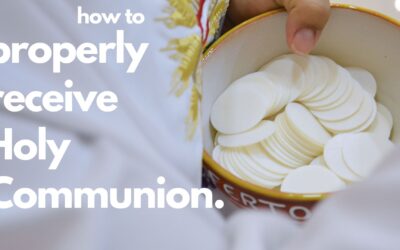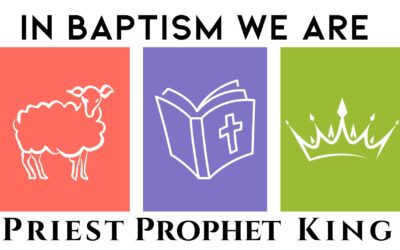Father Nathan Homily | First Sunday of Lent |
February 21, 2021
1st Sunday of Lent
“This is the time of fulfillment.
The kingdom of God is at hand.
Repent, and believe in the gospel.”— Mk 1:15
1st Sunday of lent
Today’s Readings:
First Reading — Gn 9:8-15
Responsorial Psalm — Ps 25:4-5, 6-7, 8-9
Your ways, O Lord, are love and truth to those who keep your covenant.
Second Reading — 1 Pt 3:18-22
Gospel Reading — Mk 1:12-15
What is a Covenant?
“Covenant” is one of those words that just keeps coming up when you read the Bible, in today’s first reading alone we could hear them at least five times.
When we hear of “covenant” today, it sounds like lofty legalese for “contract,” or “agreement”. We hear “agreements” for everything. But covenant is a weighty theme that dominates Scripture: it’s good to get an idea of what it means in the Bible.
We have go into lots of agreements with companies, persons and so on. So agreements are made between persons and humans. Since it’s made between humans even though it’s called to keep it in tacked but it can breakable, it’s done most of the time.
Covenants backbone of the Bible
We don’t talk a lot about covenants today. But we should. Covenants are one of the most important themes in the Bible because they act as the skeletons upon which the entire redemptive story is built. They’re like the backbone of the Bible. From Genesis on, God enters into one formal relationship after another with various humans in order to rescue his world.
These divine-human relationships push that narrative forward until it reaches its climax in Jesus. Thus, to tell the story of God redeeming his people through Jesus is to tell the story of God’s covenantal relationship with his people.
A covenant is a chosen relationship or partnership…
in which two parties make binding promises to each other and work together to reach a common goal. They’re often accompanied by oaths, signs, and ceremonies. Covenants contain defined obligations and commitments, but differ from a contract in that they are relational and personal. Think of a marriage. In love, a husband and wife choose to enter into a formal relationship binding themselves to one another in lifelong faithfulness and devotion. They then work as partners to reach a common goal, like building a career or raising children together. That’s a covenant.
Covenants make two into one.
When two parties make a covenant in the Bible, they are joined together and identified with each other. They may exchange coats (1 Sa 18:3–4), have a commemorative meal (Ex 24:11), and erect a long-lasting memorial to their promise (Gn 31:46). At every covenant’s core, there is a change in relationship.
Covenants involve promises.
People don’t just join together at random: the agreement usually includes some kind of practical application. Sometimes it means not harming one another (Gn 31:50). Sometimes it means protecting one another (1 Sa 20). Sometimes it means agreeing not to obliterate a weaker people group (Jos 9:15). In some cases, it can have everlasting consequences—we’ll get to those later.
Covenants are spiritually charged.
Covenants are taken seriously, and for good reason: two people are joining together based on little more than their words. They trust a divine being to hold them accountable.
Covenants are not easily broken. To break a covenant is a serious thing. Covenants between God and man.
Some of God’s covenants are completely unconditional: they’re not sustained by human performance. When God makes His covenant with Abraham in Genesis 15, He doesn’t require anything from Abraham. His covenant with David was unconditional as well (1 Chr 17).Much of the Bible’s story is shaped around the covenants between God and man.
In fact, the Old Testament and the New Testament are named this way because they detail two major covenants between God and His people.
- It’s God Love to his people
- He himself takes the initiative
- Its again to be protector
- It’s to save his people
- He wants to abide with them
- He is there for them
- Above all it’s all to redeem his people and save them to eternal life…
Let us pray that during this holy season, God will kindle in our hearts the fire of his love. I wish you a very fruitful Lenten season. Amen
Join our Parish Family
Register in the parish, so that it’s easy to become a confirmation sponsor or Godparent.
Want to Lend a Helping Hand?
Find volunteer opportunities and share your talents.
Need a Helping Hand?
We are here to help. Request home visits, send a prayer request. For urgent needs call 954.943.3684
Set up Online Giving.
You can make a one-time donation or set up recurring gifts.
Past Messages from Father Nathan
From The Desk Of Father Nathan | April 14, 2024
Instructions for the proper way to receive Holy Communion in the US Catholic Church.
From The Desk Of Father Nathan | April 07, 2024
Happy Easter, it was wonderful to see so much participation in Holy Week. Special thanks to our volunteers who generously give their time.
From The Desk Of Father Nathan | March 31, 2024
Jesus is risen. Rejoice. Easter Sunday serves as a profound reminder of the transformative power of faith and the enduring message of hope.
From The Desk Of Father Nathan | March 24, 2024
Solemnity of Saint Joseph, husband of the Blessed Virgin Mary. Tuesday, March 19th, we will celebrate the feast day of St. Joseph.
From The Desk Of Father Nathan | March 17, 2024
Solemnity of Saint Joseph, husband of the Blessed Virgin Mary. Tuesday, March 19th, we will celebrate the feast day of St. Joseph.
From The Desk Of Father Nathan | March 10, 2024
Ministry Sundays March 9 & 10 + March 16 & 17 following each mass. St. Gabriel extends the invitation to get involved in parish activities.






